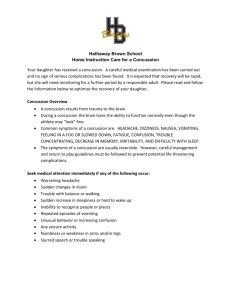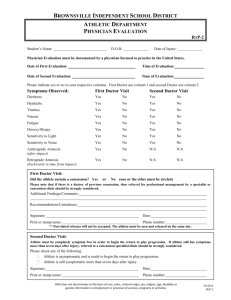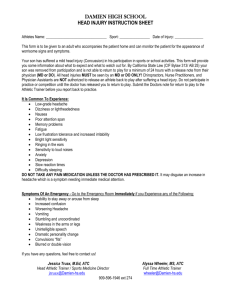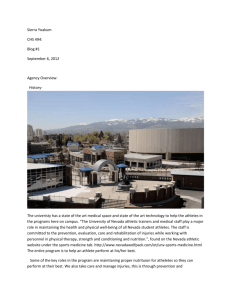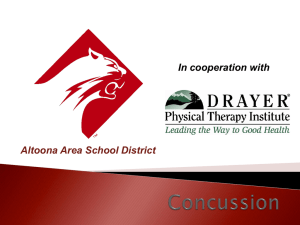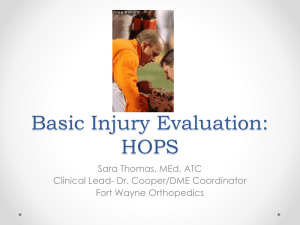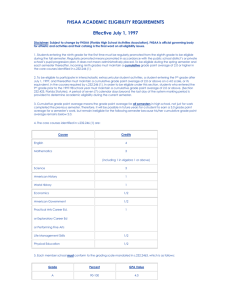Evaluating Athletic Trainer
advertisement
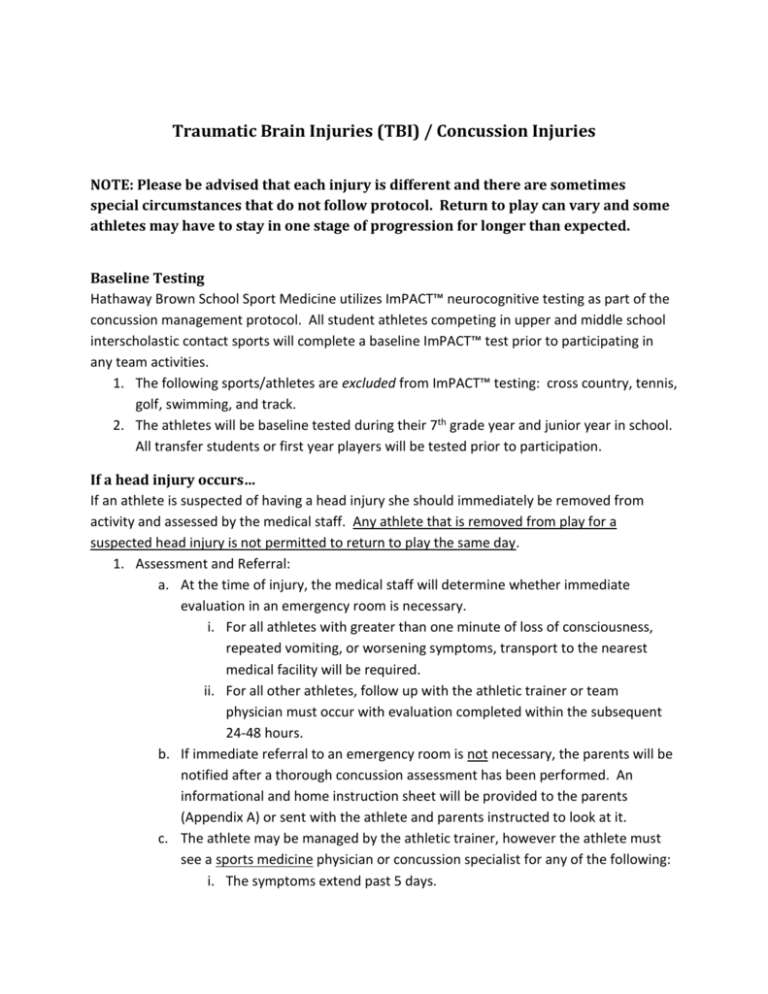
Traumatic Brain Injuries (TBI) / Concussion Injuries NOTE: Please be advised that each injury is different and there are sometimes special circumstances that do not follow protocol. Return to play can vary and some athletes may have to stay in one stage of progression for longer than expected. Baseline Testing Hathaway Brown School Sport Medicine utilizes ImPACT™ neurocognitive testing as part of the concussion management protocol. All student athletes competing in upper and middle school interscholastic contact sports will complete a baseline ImPACT™ test prior to participating in any team activities. 1. The following sports/athletes are excluded from ImPACT™ testing: cross country, tennis, golf, swimming, and track. 2. The athletes will be baseline tested during their 7th grade year and junior year in school. All transfer students or first year players will be tested prior to participation. If a head injury occurs… If an athlete is suspected of having a head injury she should immediately be removed from activity and assessed by the medical staff. Any athlete that is removed from play for a suspected head injury is not permitted to return to play the same day. 1. Assessment and Referral: a. At the time of injury, the medical staff will determine whether immediate evaluation in an emergency room is necessary. i. For all athletes with greater than one minute of loss of consciousness, repeated vomiting, or worsening symptoms, transport to the nearest medical facility will be required. ii. For all other athletes, follow up with the athletic trainer or team physician must occur with evaluation completed within the subsequent 24-48 hours. b. If immediate referral to an emergency room is not necessary, the parents will be notified after a thorough concussion assessment has been performed. An informational and home instruction sheet will be provided to the parents (Appendix A) or sent with the athlete and parents instructed to look at it. c. The athlete may be managed by the athletic trainer, however the athlete must see a sports medicine physician or concussion specialist for any of the following: i. The symptoms extend past 5 days. ii. iii. iv. v. vi. vii. viii. The symptoms are not improving on a daily basis. The symptoms are worsening. There are unusual symptoms. The athlete visited the emergency room. The symptoms return twice during return to play progression. The athlete has had more than one concussion. There is any discrepancy between parents or coaches and the athletic trainer (parents or coaches disagree with diagnosis or management). d. The parent/guardian will receive a follow up phone call or email from the school psychologist or school administrator to go over guidelines and protocols for academic progression following a head injury. Often times, the school administration will work doctor’s recommendations. e. The athlete must check in with the athletic trainer on a daily basis until full return to play is approved. 2. Return to play: a. An athlete may not return to activity until: i. She is symptom free for at least 24 hours. ii. SCAT3 testing is within normal limits as determined by the athletic trainer and/or team physician. iii. ImPACT™ neurocognitive testing is within normal limits as determined by the athletic trainer and/or team physician. iv. Written clearance is provided by AT or a sports medicine physician. b. Once the above has occurred, the following progression will be used to return an athlete to full participation: i. Day 1 - low level of non-contact physical activity for 20-30 minutes (such as stationary bike). ii. Day 2 – non-contact sport-specific exercise; no head impact activities iii. Day 3 – non-contact training drills; resistance training iv. Day 4 – full contact, normal training activities after medical clearance v. Day 5 – normal game play vi. Progression should not be any faster than one step every 24 hours. vii. If any symptoms develop during the progression, the athlete should stop and report to the athletic trainer. c. Coaches are not permitted to allow an athlete to practice/compete until he/she verifies the athlete’s clearance directly with the athletic trainer. d. According to Ohio High School Athletic Association Guidelines, and consistent with Ohio State Law, only a MD, DO or other school-designated health care professional (athletic trainer) licensed in Ohio can return an athlete to play following a concussion. i. If clearance is given by a doctor other than the team physician, it will be reviewed by the athletic trainer and/or team physician to verify clearance and return to play. The athletic trainer may refer to a concussion specialist for further evaluation before allowing athlete’s clearance. 3. Education a. Coaches – all coaches, paid and volunteer, must complete an approved online concussion education course prior to their start date. i. The athletic director or athletic trainer can provide the coaches with information on how to complete the required education. ii. The course is valid for three years and expires at the time the Pupil Activity Program/Coaching Permit expires. iii. Coaches must have a current CPR and AED certification. b. Students and Parents: i. All students and their parent/legal guardian shall review and sign the “Concussion Information Sheet” developed by the Ohio Department of Health. ii. This form is required to be on file before the athlete is allowed to participate in any team activities for each sport season. PHYSICIAN SIGNATURE: _____________________________________________ PHYSICIAN NAME (print): ____________________________________________ APPENDIX A Hathaway Brown School Home Instruction Care for a Concussion Your daughter has received a concussion. A careful medical examination has been carried out and no sign of serious complications has been found. It is expected that recovery will be rapid, but she will need monitoring for a further period by a responsible adult. Please read and follow the information below to optimize the recovery of your daughter. Concussion Overview A concussion results from trauma to the brain. During a concussion the brain loses the ability to function normally even though the athlete may “look” fine. Common symptoms of a concussion are: HEADACHE, DIZZINESS, NAUSEA, VOMITING, FEELING IN A FOG OR SLOWED DOWN, FATIGUE, CONFUSION, TROUBLE CONCENTRATING, DECREASE IN MEMORY, IRRITABILITY, AND DIFFICULTY WITH SLEEP. The symptoms of a concussion are usually reversible. However, careful management and return to play guidelines must be followed to prevent potential life threatening complications. Seek medical attention immediately if any of the following occur: Worsening headache Sudden changes in vision Trouble with balance or walking Sudden increase in sleepiness or hard to wake up Inability to recognize people or places Repeated episodes of vomiting Unusual behavior or increasing confusion Any seizure activity Numbness or weakness in arms and/or legs Slurred speech or trouble speaking Other important guidelines: It is important to rest as much as possible; no physical activity/exercise until medically cleared. The athlete should limit mental activity (watching TV, computer, cell phones, video games, etc). If school work or activities that require concentration increase symptoms, stop the activity immediately. Stay hydrated and maintain a regular diet; no alcohol. It is advisable to wake the athlete every six hours the first night to make sure she can be awakened; otherwise, sleep is important for adequate recovery. Most headaches can be treated with acetaminophen as needed. Notify your doctor if this does not provide relief. Seek immediate medical care if the headache suddenly and dramatically increases. Parent/guardian should expect to receive a call from Hathaway Brown’s school Psychologist to go over academic protocol and guidelines following a head injury. The athlete needs to follow up with the athletic trainer (or physician) within the next 24 hours. Contact Information Evaluating Athletic Trainer: _______________________________________________________ Office Number: (216) 320-8796, ext. 7796 Cell Phone Number: _____________________________________________________________ Team Physician: Dr. Susannah Briskin Office Number: (440) 914-7865 Director of Department Learning Services and School Psychologist: Jennifer Stevenson Office Number: (216) 320-8094
